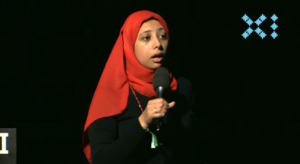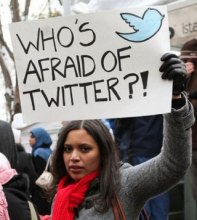Noha Atef, the Egyptian blogger behind tortureinegypt.net is giving a talk at re:publica 11 on “Egyptian social media stories” to answer questions about how Egyptians have used social media and how, overnight it seems, Egyptians managed to mobilize on social networks to assist in the revolution.
“The answer to the question: ‘Were Egyptians using social media prior to January 25?’ is yes” says Noha, sharing figures about how many Internet users exist in Egypt (21,000,000 subscriptions, 4.5 million Facebook users, according to Noha’s presentation; but only 26,800 Twitter users). She says that Egyptians have begun looking to the Internet as some sort of “magical genie” that could answer their demands. She says: “that’s wrong.”
How Egyptians Used Social Media Before the Revolution
Noha explains that the Internet has been around for awhile, and people have been using it for entertainment, information, and much more. She also notes that Egypt has a fairly high illiteracy rate. “Still,” says Noha, “Egyptians have been using new media. They film, take photographs, of protests and celebrations. If they know you’re a blogger, they’ll ask you to post their photo online.”
She shows the famous Al Ahram photoshopped image of Mubarak leading the leaders at a peace process meeting last year, and explains how bloggers blew the story out of the water by tweeting, retweeting, and photoshopping, then blogging the image again and again, and how that created a scandal.
Did the Use of Social Media Pave the Way to Revolution?
Noha’s initial answer to the question is “yes.” She says that social media, and traditional media, shape the views of the public, and since the public made the revolution happen, then of course media and social media influenced that.
She then notes the influence of Egypt’s anti-torture movement, showing this video, created by TortureinEgypt.net:
Noha talks about initiatives that followed, including Piggipedia and Torturepedia, which laid out names along with the crimes committed by each person.
“We Are All Khaled Said”
Noha then tells the story of Khaled Said – “You may have heard about him” – and states that “if we can say anyone was behind the revolution, he was one of them.” She explains what happened, then says “He’s my age, he’s young…he’s almost my level of education, he’s my social class. That’s why his death was mobilizing to young people in Egypt.”
The Facebook page, “We Are All Khaled Said“, created by Wael Ghonim in 2010, eventually received over 1 million visitors, with its English counterpart reaching into the 100,000 range. “To feel [the members’] passion for seeking justice for this one person…social media definitely mobilized them.”

Did social media help spread the revolutions? Noha says that most people think of Egypt as a tourist destination, or perhaps looks at its role in the Peace Process. “There have been many mini-revolutions over the years,” explains Noha, showing a photograph from 2006. She says that between April 2009 and May 2010, there were 169 sit-ins, 112 strikes, 87 demonstrations, and 63 protest marches in Egypt. “The revolutions do not happen overnight,” says Noha, “it’s not like all of a sudden something happened.”
Someone from the audience asks about Noha’s experience with hosting services; she refers to my talk yesterday, and explains that when torture videos were posted to YouTube, the platform censored them, saying that the content was too violent or included too much sexual content. With Piggipedia, Egyptians stormed state security offices and got documents, some of which Hossam El-Hamalawy posted online; Flickr then took down the content, because the photos “didn’t belong to” Hamalawy.
She also says that blogging platforms like Maktoob, now owned by Yahoo!, used to take down content, or add things to your blog like “Happy Birthday King Abdallah” (the company was Jordanian) without your permission.
“Now I’m revealing one of the most confidential facts about the Egyptian revolutions,” quips Noha, showing a video of a tearful caller claiming that Tahrir Square was taken over by foreigners speaking English, and that they were ruining the country. That caller was none other than popular singer Tamer Hosny, crying and begging state television to enter Tahrir and report on what was happening.
Noha jokes: “Tamer revealed the big secret: that the protests in Tahrir Square were organized by English-speaking foreigners.” She explains: “This is just a sample of what state TV was doing, portraying the revolution as if it were a conspiracy.”
When Egypt turned off the Internet and scrambled mobile signals (there are 70 million mobile subscriptions in Egypt, ~80% of the population), Noha explains that it drew more people into the streets. She explains that censorship became a part of the cause, and that despite the Internet shutdown, people were taking photos and videos, knowing that at some point the Internet would be available again. They were documenting everything that they could.

She points out various sites like “I was in Tahrir” that allowed people to add their names and locations to the protest, as a sense of pride.
Post-Revolution
Noha notes that post-revolution, Internet penetration has increased by 2 million users, and that people now spend 1,800 minutes online per month, doubled from last year. Facebook’s user base in Egypt has increased to 5 million, and Twitter users now rank around 45,000.
She also talks about how, in Tahrir Square, some bloggers and activists managed to get online (see Wired’s piece on Tahrir’s geeks).
“If you Google stories from the revolution, you’ll find some interesting stories,” says Noha. “Social media didn’t create the revolution; people create revolutions, but social media can be a very powerful too. If people learn how to use these tools, they will make change.”
Q&A
After a hearty round of applause, Noha takes audience questions:
Q: “Once items are uploaded to Piggipedia or other sites, how are they verified? Is further action taken?”
“Not every officer has been charged, and not all of the content is uploaded by us. We’ve got around 150 members and roughly 500 pictures,” explains Noha. “So far we haven’t had a situation where a victim recognizes the man who tortured him via the site.”
Q: “How dangerous was it to collect this evidence?”
“I cannot give a definitive answer, as many people took the pictures, but it’s not very difficult to take a photo of a police officer.” Noha says she has a good technique: she smiles at the officer, he smiles back, she raises her camera, takes a photo, and keeps smiling. “It’s one of the privileges of photos; if you don’t include text with them you’re fairly safe, as the photo won’t be indexed. Those who add text are the ones who end up getting intimidated by police officers.”
Q: “A website like this couldn’t remain up in Germany; the rights of officers would come into play. Is this site hosted in Egypt or somewhere else?”
“It’s hosted in Egypt,” Noha says. She also says that, prior to January 25, the government didn’t filter, because Mubarak wanted to appear liberal to the West. Instead of blocking websites, they would intimidate, harass, or arrest bloggers. “In 2009, more than 100 bloggers in Egypt were arrested in Egypt. After the year 2000, there were Internet police, an administrative unit that monitored the Internet. When we stormed the state security building, we found emails and other online logs. All online activities had been monitored.”
5 replies on “re:publica 11: noha atef on egyptian social media stories”
[…] Jillian C. York » re:publica 11: noha atef on egyptian social media stories SAVE | SHARE @jilliancyork's "re:publica 11: @NohaAtef on #Egyptian #socialmedia stories" of #jan25 http://t.co/EYMB6kl – Ahmad Gharbeia (aGharbeia) http://twitter.com/aGharbeia/status/58580303488356355 […]
Noha Atef about the influence of digital communication on the revolution in Egypt
http://www.youtube.com/watch?v=updEGjNky40
Noha Atef about her fight against torture in Egypt
http://www.youtube.com/watch?v=yRevCUeI2sk
[…] werden und die Welt verändern – wie in Tunesien oder Ägypten geschehen. So entzauberte Jillian C. York von globalvoicesonline.org zum Beispiel das Schlagwort der Facebook- und Twitter-Revolution. Auch […]
[…] was live blogged here by my amazing friend […]
I’m amaze of your strong personality in doing this social media for your people for them to know what had happen in all Egypt in the hand of Mubarak.
Noha Atef about the influence of digital communication on the revolution in Egypt.
http://www.youtube.com/watch?v=updEGjNky40&feature=related